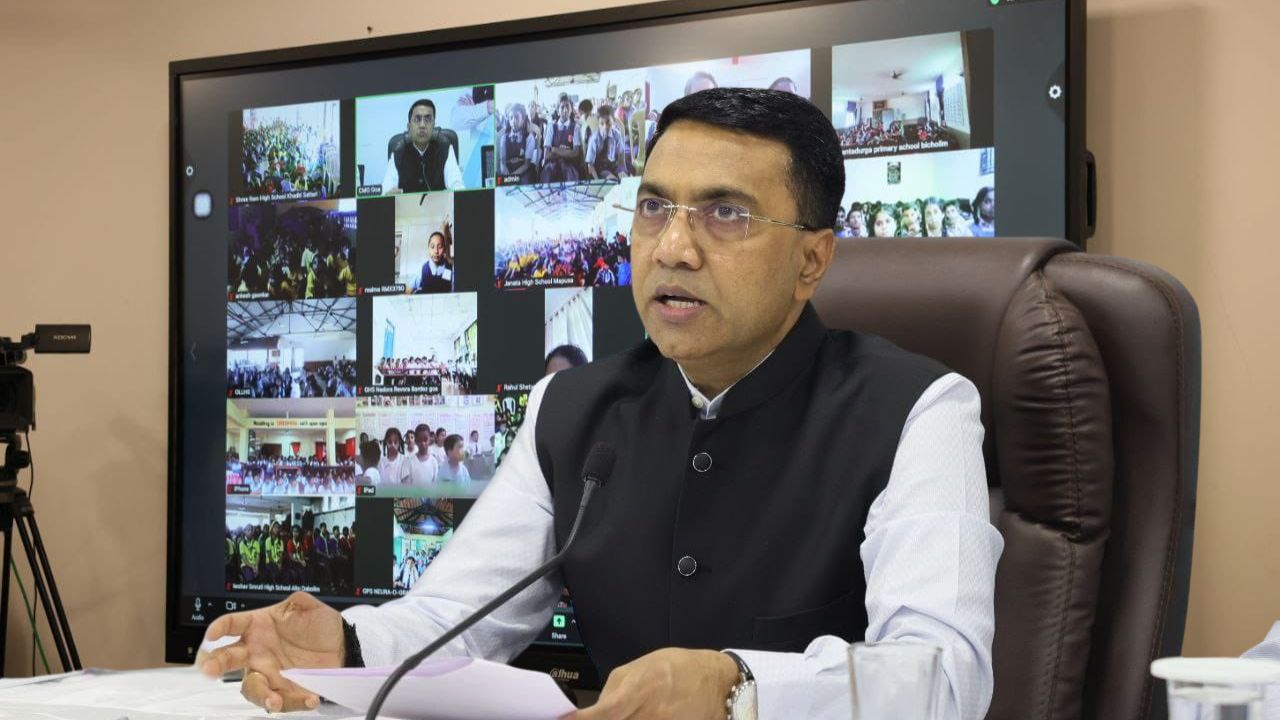
PANAJI: Chief Minister Pramod Sawant has clarified that the State government was not responsible for the closure of government primary schools, attributing it instead to shifting parental preferences.
“Parents themselves began moving their children to city or aided schools, which led to a drop in enrolment. This ultimately forced some closures,” Sawant said during a live interaction on the implementation of the Mulyavardhan programme in schools.
He further clarified that no Marathi-medium government primary schools were arbitrarily shut down. “In fact, most Marathi schools were either renovated or newly constructed to meet current needs,” Sawant said. Some schools, he explained, were merged purely for administrative reasons and to ensure better staffing and teaching quality.
Assuring that the government remains committed to strengthening the public school network, Sawant said, “The government has initiated a teacher recruitment process, and once it is complete, even the smallest schools will have a minimum of four teachers. We are appointing at least four new teachers in primary schools with inadequate staff.”
The Chief Minister emphasised that the aim is to ensure every government primary school, especially those conducting Classes I to IV, has a full-fledged teaching faculty. “We are committed to making this happen soon,” he added.
Sawant said that the education sector in Goa is undergoing a quiet transformation, guided by value-based learning, technology integration, and data-driven governance. He praised the Mulyavardhan programme for instilling core values in young students.
“This programme is nurturing values like justice, equality, honesty, and empathy through engaging, activity-based learning. We are building not just smart schools, but a smarter, more compassionate generation,” he said. “NEP 2020 and NCF 2023 are our guiding lights.”
Calling for more sensitive and respectful classroom practices, Sawant remarked, “I feel bad to see teachers face police complaints for assaulting students. We must move away from punitive methods. Through Mulyavardhan, we encourage educators to identify student creativity and nurture it with care and responsibility.”
The Chief Minister stated that Goa was the first state to implement the Mulyavardhan programme, which is now operational in 983 primary schools and reaches over 71,900 students. “Teachers are first trained, counsellors then conduct activities, and third-party agencies monitor progress. This structure ensures accountability and results,” he explained.
Sawant also announced the introduction of four new practical subjects under Mulyavardhan 3.0: waste management, personal hygiene, road safety, and yoga. “These are not just academic additions, they are essential life skills,” he said.
Explaining their relevance, Sawant said, “We have taught children how to manage dry waste in collaboration with waste management corporations. We have emphasised the importance of hygiene, from trimming nails to daily cleanliness. Road safety is critical. If children learn traffic discipline early, we can prevent future accidents.”
He also highlighted the role of yoga in student well-being. “Yoga improves concentration and reduces stress. If introduced early, it enhances both physical and mental health. I urge schools to conduct 15-minute yoga and pranayama sessions every morning,” he said.
Addressing efforts to modernise infrastructure in government schools, the Chief Minister said, “You can clearly see the difference between schools of the past and classrooms of today. Our schools now have smart boards, digital tools, and thematic architecture celebrating national heroes.”
He also pointed to the government focus on future-ready education. “More than 65,000 students across over 440 schools are receiving training in coding and robotics. This is how we prepare our children for the future,” he said.
The Chief Minister further underlined the role of real-time monitoring through the Vidya Samiksha Kendra. “It is tracking over two lakh students and teachers. This helps us assess performance, intervene when needed, and improve learning outcomes,” he said.
Sawant also cautioned against the misuse of the government school transport scheme, Balrath. “It is only meant for students living within 3 km of the school. It should not be used to bring students from 15–20 km away. That is not its purpose,” he warned.
Concluding his address, Sawant reaffirmed the government long-term vision: “We are moving toward making Goa a 100 percent literate state. Under the New India Literacy Programme, we have already achieved 99.27 percent adult literacy. We are not just reforming education, we are reimagining it to empower the next generation of responsible citizens.”